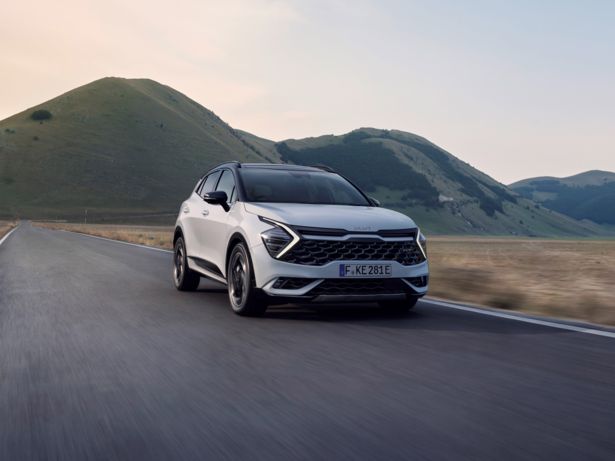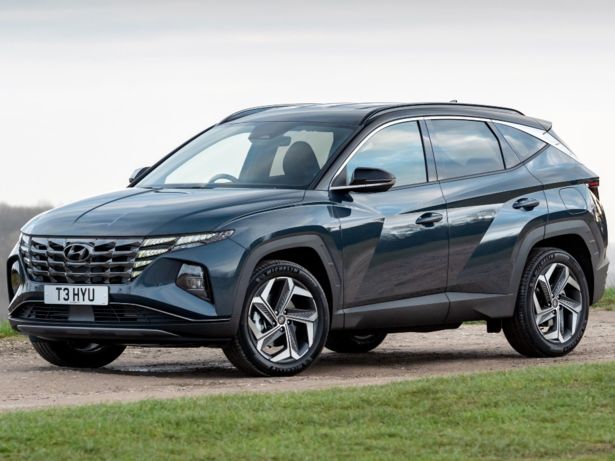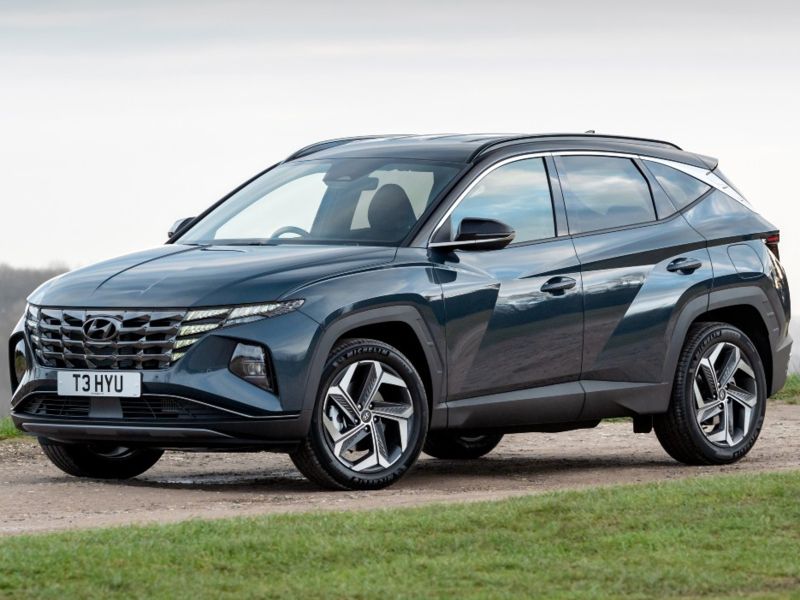
Kia Sportage vs Hyundai Tucson: which is best?

SUVs are the most popular type of new car in the UK, and two of the best selling are the Kia Sportage and Hyundai Tucson. We reveal what sets them apart and which one to go for.
Although they share a great deal, including the same vehicle platform and similar engines, there are plenty of subtle (and some more obvious) differences between the two models, which have been borne out in our lab tests and annual reliability survey.
Which? members can log in to see the full version of this article, complete with test scores and reliability information. Alternatively, join Which? today to get instant access.

Kia Sportage vs Hyundai Tucson: the lowdown
| Kia Sportage (2022-) | Hyundai Tucson (2021-) | |
| Price from | £27,879 | £29,991 |
| Petrol (including mild hybrid) options | ✓ | ✓ |
| Full hybrid options | ✓ | ✓ |
| Plug-in hybrid options | ✓ | ✓ |
| Diesel options | ✓ (used only) | ✗ |
| Dimensions | 4.5 x 2.13 x 1.65 metres | 4.51 x 2.09 x 1.65 metres |
| Turning circle | 11.65-11.95 metres | 11.90-11.95 metres |

The fifth-generation Kia Sportage was launched in 2022 with a broad range of power options: petrol mild hybrid, full hybrid and plug-in hybrid (PHEV). It has sharp looks and lots of technology, while power ranges from 115hp right up to 265hp. Diesel and pure-petrol variants are now available used only.
Most Sportage models are front-wheel drive, but all-wheel drive is available in certain engine and trim level configurations.

Hyundai’s Tucson has been around since 2004. The fourth generation of this medium-sized SUV was launched in the UK in 2021, with styling that makes it stand out from the crowd. There are currently petrol and mild-hybrid petrol models, as well as full-hybrid and plug-in hybrid options. They all use a 1.6 litre engine which, in the pure petrol and mild-hybrid models, produces 150hp.
The current Tucson petrol and mild hybrid range is exclusively two-wheel drive – a four-wheel-drive option was originally available at launch but has since gone off sale. All mild-hybrid models are fitted with a seven-speed automatic gearbox, while pure-petrol versions have a six-speed manual gearbox.
Both models use the same basic platform (a shared set of basic engineering features), which was jointly developed by Kia and Hyundai. They use the same type of Hyundai engine, and both were facelifted in 2024 (although the facelifted Sportage is yet to be introduced to Europe).
Of the current versions, we've lab tested the following models:
- Kia Sportage diesel mild hybrid
- Kia Sportage petrol plug-in hybrid
- Hyundai Tucson petrol mild hybrid
- Hyundai Tucson petrol full hybrid
- Hyundai Tucson petrol plug-in hybrid
Best medium and large SUVs: find out which models performed best in our tests
Driving and handling
| Which? test | Kia Sportage (2022-) | Kia Sportage Plug-in Hybrid (2022-) | Hyundai Tucson (2021-) | Hyundai Tucson Hybrid (2021-) | Hyundai Tucson Plug-in Hybrid (2021-) |
| Visibility | Sign up to reveal Get instant access to this and all our scores and recommendations Unlock tableDigital £8.99 per month, cancel any time. Already a member? Log in | ||||
| Smoothness of power delivery | |||||
| Driving stability | |||||
| Cabin layout | |||||
| Overall | |||||
Sign up to reveal
Get instant access to this and all our scores and recommendations
Unlock tableDigital £8.99 per month, cancel any time.
Already a member? Log in
Log in or join Which? to unlock this table
Our full test scores are exclusive to Which? members, but perhaps the most significant difference is with the cabin layouts: the Sportage’s touchscreen is more complicated to navigate than the system in the Tucson, and we thought the rotary controls in the Sportage’s cabin were unintuitive.
Bear in mind that the facelifted Tucson has a completely different interior setup, which has more physical controls.
Like most modern cars, both the Sportage and Tucson have wide rear roof pillars, which does affect rearward visibility.
However, all models in the current Sportage and Tucson ranges have plenty of parking aids, which help to mitigate this.
Reliability
| 0-4 year reliability | Kia Sportage (2022-) | Kia Sportage Plug-in Hybrid (2022-) | Hyundai Tucson (2021-) | Hyundai Tucson Hybrid (2021-) | Hyundai Tucson Plug-in Hybrid (2021-) |
| Owners that reported one or more faults | Sign up to reveal Get instant access to this and all our scores and recommendations Unlock tableDigital £8.99 per month, cancel any time. Already a member? Log in | ||||
| Owners that reported breakdowns | |||||
| Average time off road | |||||
| Overall rating | |||||
Sign up to reveal
Get instant access to this and all our scores and recommendations
Unlock tableDigital £8.99 per month, cancel any time.
Already a member? Log in
Log in or join Which? to unlock this table
Reliability is another area where each model performs, but our survey data revealed some interesting differences.
Hybrid Tucsons and Sportage PHEVs are off the road for less time when faulty compared with pure-petrol models. While the Sportage Plug-in Hybrid has a lower fault rate, its breakdown rate is much higher than the non-PHEV Sportage and the non-PHEV Tucson, which is the outlier for reliability.
Looking at the most common individual faults across all models, owners reported charging and fuel cap issues, along with problems with the exterior, non-engine electrics and the 12V battery.
To find out detailed reliability information for all models, join Which? today.
Most reliable cars: view the models that scored highest in our latest survey
Comfort and practicality
| Which? test score | Kia Sportage (2022-) | Kia Sportage Plug-in Hybrid (2022-) | Hyundai Tucson (2021-) | Hyundai Tucson Hybrid (2021-) | Hyundai Tucson Plug-in Hybrid (2021-) |
| Entry and exit | Sign up to reveal Get instant access to this and all our scores and recommendations Unlock tableDigital £8.99 per month, cancel any time. Already a member? Log in | ||||
| Seat comfort | |||||
| Ride quality | |||||
| Quietness | |||||
| Seat space | |||||
| Boot space | |||||
| Overall | |||||
Sign up to reveal
Get instant access to this and all our scores and recommendations
Unlock tableDigital £8.99 per month, cancel any time.
Already a member? Log in
Log in or join Which? to unlock this table
The Sportage and Tucson score similarly here too. In all models, space up front is good, with enough legroom for anyone up to 6ft 5in tall, plus headroom for even taller people (although there’s slightly less front space in the Tucson Hybrid than the other cars). All offer the same amount of rear passenger space, accommodating people up to 6ft 6in tall.
| Which? measurement | Kia Sportage (2022-) | Kia Sportage Plug-in Hybrid (2022-) | Hyundai Tucson (2021-) | Hyundai Tucson Hybrid (2021-) | Hyundai Tucson Plug-in Hybrid (2021-) |
| Boot space (seats up) | 395 litres | 395 litres | 410 litres | 440 litres | 410 litres |
| Boot space (seats down) | 1,395 litres | 1,395 litres | 1,395 litres | 1,425 litres | 1,395 litres |
While each car scores very well for boot space, the Tucson Hybrid has the most whether the rear seats are used or folded. The Sportage is lower to the ground, making it easier to load luggage than with the Tucson.
Safety
| Kia Sportage (2022-) | Kia Sportage Plug-in Hybrid (2022-) | Hyundai Tucson (2021-) | Hyundai Tucson Hybrid (2021-) | Hyundai Tucson Plug-in Hybrid (2021-) | |
| Euro NCAP rating | |||||
| Which? safety kit rating |
Both the Tucson and Sportage have five-star Euro NCAP scores and come with a decent range of safety kit as standard.
On the Sportage, standard safety equipment includes forward collision-avoidance assist, lane-keep assist and detection for pedestrians, cyclists and junctions. However, only the highest-spec Sportage comes with the best safety tech, which includes blind-spot assist and parking collision-avoidance assist.
With the Tucson, all models come with AEB, front-collision avoidance, driver-attention warning and downhill brake-control systems. All but the cheapest Tucson models have junction-turning detection, while only top-range models get a blind-spot monitor and an uprated front collision-assistance system that can detect vulnerable road users when turning into junctions.
Fuel economy
| Which? test | Kia Sportage (2022-) | Kia Sportage Plug-in Hybrid (2022-) | Hyundai Tucson (2021-) | Hyundai Tucson Hybrid (2021-) | Hyundai Tucson Plug-in Hybrid (2021-) |
| Tested engine | 1.6 CRDI AWD DCT | 1.6 T-GDI Plug-In Hybrid AWD | 1.6 T-GDI 48V-Mild Hybrid Prime DCT | 1.6 T-GDI Hybrid Prime Automatic | 1.6 T-GDI Plug-in Hybrid AWD |
| Tested fuel type | Diesel mild hybrid | Petrol plug-in hybrid | Petrol mild hybrid | Petrol hybrid | Petrol plug-in hybrid |
| Combined test (mpg) | |||||
| Urban (mpg) | |||||
| Countryside (mpg) | |||||
| Motorway (mpg) |
Log in or join Which? to unlock this table
As you might expect with a plug-in hybrid, you can make significant savings on running costs with the Sportage and Tucson PHEVs when running them with the battery only. However, our tests revealed that fuel consumption rockets when they're empty, especially on the motorway.
If you can’t charge at home, the Tucson Hybrid should be the cheapest to run in most situations, with the (used-only) diesel Sportage offering better motorway economy.
Are there any alternatives to consider?
It’s fair to say that the Tucson and Sportage have plenty of competitors.
Other popular hybrid SUVs include the Ford Kuga and Nissan Qashqai e-Power, Honda ZR-V. If you're after a plug-in hybrid, it's worth checking our reviews of the Cupra Formentor, Mazda CX-60 and Toyota RAV4. Click through to our reviews to find out how they all fared.
For even more options, see our guide to the best family cars.
Sportage or Tucson: which should I buy?
There's a lot to like about both cars, including five-star Euro NCAP ratings and decent warranties (Hyundai's five-year, unlimited-mileage warranty will appeal to high-mileage drivers, while Kia’s seven-year warranty offers longer peace of mind albeit with limited mileage).
The PHEV versions of both perform well for fuel economy, but only for shorter journeys. As with all PHEVs, fuel economy plummets when the battery is depleted, so you'll need to make sure you keep it topped up.
Our full reviews and test scores reveal how each model performs and will help you decide which is best for you (join Which? to get instant access).
Full Which? test scores and reviews
- Sign up to reveal scoreAll new and used car reviews

Hyundai
Tucson Plug-in Hybrid (2021-)
£36,652Typical priceTest score Digital £8.99 per month, cancel any time.
Already a member?Log inFrom 19.98p per mile738out of 798 products for running cost - Sign up to reveal scoreAll new and used car reviews

Kia
Sportage Plug-in Hybrid (2022-)
£39,044Typical priceTest score Digital £8.99 per month, cancel any time.
Already a member?Log inFrom 17.05p per mile663out of 798 products for running cost - Sign up to reveal scoreAll new and used car reviews

Hyundai
Tucson hybrid (2021-)
£33,824Typical priceTest score Digital £8.99 per month, cancel any time.
Already a member?Log inFrom 14.12p per mile499out of 798 products for running cost - Sign up to reveal scoreAll new and used car reviews

Hyundai
Tucson (2021-)
£31,463Typical priceTest score Digital £8.99 per month, cancel any time.
Already a member?Log inFrom 15.9p per mile611out of 798 products for running cost - Sign up to reveal scoreAll new and used car reviews

Kia
Sportage (2022-)
£29,217Typical priceTest score Digital £8.99 per month, cancel any time.
Already a member?Log inFrom 14.58p per mile543out of 798 products for running cost
Drive smarter and cut costs using our expert advice. Get our free monthly Cars newsletter
Compare car insurance
Find the right policy for your vehicle using the service provided by Confused.com
Get a quote now














